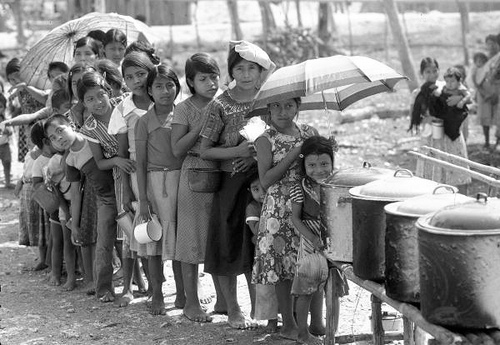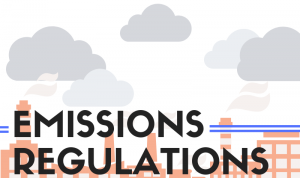Centering on Central America

UN Photo/Pat Goudvis
Guatemalan children living in refugee camps, in the State of Campeche, wait to get their food ration.
February 11, 2019
Gunshots deafen the screams of thousands of civilians running from the rampant violence that continues to stamp over the Northern Triangle. Men and women from the region desperately protest for their human rights, hoping someone will answer the cries of a boy coerced by the Mara Salvatrucha to murder his best friend, a girl hiding in her room in fear of the gang waiting for her outside, a mother weeping over the body of her 12-year-old son who was just walking to the grocery store at the wrong time.
Yet, 1,505 miles north, all we can talk about is the wall.
“Americans first, immigrants later!” they bellow.
Yet, as we ignore the thousands who are putting their lives in peril, not only are we sacrificing those who made the dangerous journey to the border, we are also compromising the same values of equality that built this country.
With Trump’s increasingly stringent measures concerning immigration, asylum seekers from Honduras, El Salvador and Guatemala–notorious Northern Triangle– are being overshadowed by conservative mindsets eager to close the borders.
But before discussing the crises in Central America, it’s important to understand current immigration policies and how they have changed under Trump.
Asylum is a political protection given to refugees who come to the United States trying to escape five types of persecution: religious, political, violent, racial and ethnic. However, under the Trump administration, the quota of refugees admitted to the United States has drastically decreased. Moreover, the U.S. isn’t granting enough refugees asylum to meet that cap, perpetuating the U.S.’s lack of assistance to those who need it the most. The Center for Immigration Studies found that in the fiscal year 2018, the cap was 45,000, but only 22,491 people were accepted.
And it’s not like demand for asylum is decreasing. More asylum seekers from Central America have requested asylum between 2013 and 2015 than from all other countries in the last fifteen years combined, according to a study by the Transactional Transactions. Yet, about 80 percent of applications from asylum seekers have been rejected.
While there should be a reasonable cap to refugees, failure to meet that cap is absolutely ridiculous. It is one thing to argue that a nation doesn’t have the resources to properly take care of and rehabilitate refugees, and a completely different thing to barely meet 50 percent of the nation’s cap, while making the process to apply for asylum even more inconvenient for those who have already suffered just to be able to start it.
To add to an already-tedious list of restrictions, Trump is limiting entry points for refugees through a proclamation he signed back in November, excluding any immigrant or class of immigrants he deems a threat to U.S. national security.
Activist groups, such as the ACLU, argue that this is, in fact, illegal and breaks the Universal Declaration of Human Rights drafted by the United Nations.
Moreover, Trump is militarizing the border, bringing thousands of soldiers to stop refugees from entering the border. Ironically, this only serves to strengthen crime groups who capitalize off of those separated at the borders. Enforcing the law with border agents who themselves fall for corruption and bribes simply reinforces our country’s hypocrisy.
As we supposedly start making America great again, the ethicality and credibility of the United States must be called into question. We have long stood and fought for human rights, but as the time comes to help those in need, the U.S has repeatedly failed to do so, promoting a facade of concern over the nation while simulateneously taking measures that do the exact opposite.
Furthermore, the circumstances and environments of Guatemala, El Salvador and Honduras, if anything, make our refusal to help the persecuted a direct denial of civil rights.
These three countries all continue to rank high on the International Corruption Index. With histories that go back to the civil war, roots of guerilla violence have propelled the region into a state of continuous violence and instability.
A common argument is that Central America should take steps themselves to reform their government to prevent dependency. Attempts have been made in all countries, and many have failed. Yet, new programs with help from the U.S. have set them into action. For example, the Guatemalan government and the U.S. recently created the International Commission Against Impunity in Guatemala to fight corruption and impunity. In the past couple years, this organization has been extremely active in their role; they were responsible for the arrests of then-president Otto Pérez Molina and former Vice President Roxana Baldetti, who were accused of bribery. However, it is key to realize that the reformation of these developing nations is a long-term implementation and is not likely to happen soon.
In the meantime, it is crucial that the Trump administration protect those who are seeking asylum and to look to the real reasons as to why we are limiting quotas to such extremes. Is the motive truly American safety when we are compromising that very thing through the lengthy measures taken to prevent immigration? As we start to set dangerous precedents for the recognition of human rights for other people, we should carefully consider the sacrifices we are making in order to “Make America Great Again.”


